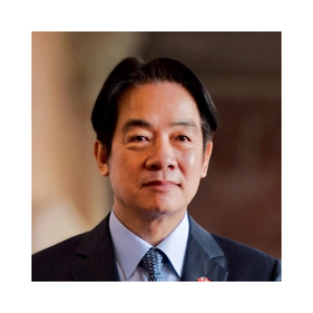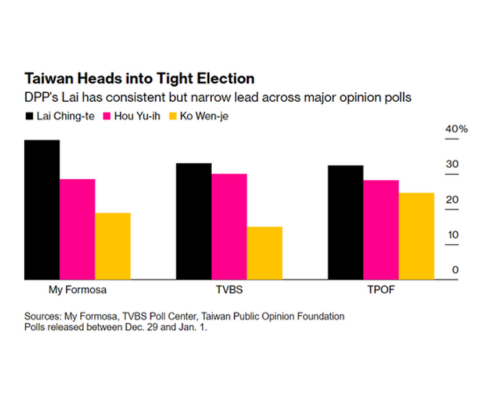At a Glance
- On January 13, the Taiwanese people will vote for a new president. The election has significant domestic and geopolitical implications: there could be a continuation of rising cross-strait and US-China tensions, or a new era of closer China-Taiwan ties.
- The outcome is uncertain. The Democratic Progressive Party (DPP) candidate’s early lead in opinion polls has been narrowing. After eight years of DPP leadership, many Taiwanese may vote for change and back the traditional Kuomintang (KMT) or the upstart Taiwan People’s Party (TPP).
- While relations with China are a central theme, a sluggish economy, tough job market, affordable housing, energy security and elderly and health care are key voter issues.
- Beijing’s response to the election outcome will be critical to watch. Senior officials reiterate the goal of peaceful reunification with Taiwan but continue to note they do not rule out the use of force.
Taiwan Presidential Elections 101
On January 13, Taiwan will vote for president, kicking-off a record-breaking year for global elections—over sixty countries will head to the polls in 2024. From a geopolitical perspective, the young democracy’s eighth national election will be one of the most consequential—the outcome will impact the trajectory of Taiwan-China relations for years to come with potentially far-reaching impact on geopolitics, global trade, regional stability, and advanced tech supply chains. Today, roughly 50% of commercial container traffic passes through the Taiwan Strait every day and 90% of all advanced semiconductors are made in Taiwan. The results of this election—and the ongoing complexity around Taiwan’s status—will factor into the global economic outlook and should be a foundational consideration to corporate strategies for 2024.
Relations with China loom large
Taiwan’s relationship with the People’s Republic of China (PRC) is a focal issue of the three-way race between the Democratic Progressive Party (DPP), Kuomintang or Nationalist Party (KMT), and the Taiwan People’s Party (TPP). Questions about pursuing closer ties with China or strengthening Taiwan’s sovereignty have led some candidates to frame the election as one of “democracy vs. autocracy” and “war vs. peace.” Yet no party wants conflict with China, and all candidates are in favor of the status quo and maintaining peace and stability.
That said, the KMT and TPP are more open to dialogue and engagement with Beijing while the DPP takes a stronger position on strengthening the island’s defense capabilities and relations with the United States—itself a point of tension. Beijing views the DPP as putting Taiwan on a path of pro-independence and, of the three parties, is viewed as the greatest challenge to the One China Principle—a long-standing red line asserting that that Taiwan is an inalienable part of China.
Beijing’s stance
Beijing ended official communications with the DPP after President Tsai Ing-wen was elected in 2016. During her tenure, cross-strait tensions increased, most notably following the visit of former US House Speaker Nancy Pelosi in 2022. Now, Tsai is stepping down after reaching her two-term limit, but her current Vice President and DPP candidate Lai Ching-te is expected to carry forward her policy on cross-strait relations, should he win. While Lai is the frontrunner, his lead has narrowed to just three percentage points, so a DPP win is far from certain.
In the run-up to the elections, Beijing has stepped up economic pressure on the DPP, including ending certain tariff cuts and threatening further trade sanctions in response to what it calls the DPP’s adherence to its “independence position.” Senior Chinese officials have also recently commented on Taiwan, notably President Xi Jinping whose New Year’s address reiterated that China’s reunification with Taiwan is inevitable. Though Beijing’s engagement during the campaign has been relatively restrained thus far, it will be important to watch how Beijing’s rhetoric and actions shift in response to the results.
Domestic issues matter too
While relations with China dominate headlines, political debate, and voter concern, economic and a range of domestic policy issues from immigration to energy security and social welfare are also top of mind for many Taiwanese voters. After eight years of sluggish economic growth marked by pandemic challenges, young voters facing high rents, low wages, and a challenging job market, may vote for change. Whether they will be a decisive voting bloc, however, will be decided next Saturday.
The Candidates and Their Parties
Lai Ching-te (William Lai), Current Vice President of Taiwan
Democratic PROGRESSIVE PARTY (DPP)
“I will support the cross-strait status quo—which is in the best interests of both the Republic of China, as Taiwan is formally known, and the international community. I will never rule out the possibility of dialogue without preconditions, based on the principles of reciprocity and dignity.”
the best interests of both the Republic of China, as Taiwan is formally known, and the international community. I will never rule out the possibility of dialogue without preconditions, based on the principles of reciprocity and dignity.”
— Lai Ching-te July 4, 2023
- The DPP is seen as the most “pro-independence.” They refuse to recognize the 1992 Consensus, an understanding reached between Taiwan's then-ruling KMT and Beijing that both sides recognize there is only "one China”—but differ in their interpretations of what “China” means. Without this precondition of engagement, Beijing halted official communications when the DPP’s Tsai was first elected president in 2016. Tensions have since continued and Beijing increasingly views the DPP leadership as “separatists.” The DPP is willing to re-engage with China, but “without preconditions”—like accepting the 1992 Consensus.
- Lai is a former mayor of Tainan and has been Tsai’s vice president for the last four years. He is leading in the most recent major opinion poll published on January 2 with 38.9% of the vote—three percentage points ahead of the KMT’s Hou Yu-ih, but down from a previous lead of 11 percentage points.
- While Lai has said he supports maintaining the status quo, he is a strong proponent of building up the island’s military deterrence capabilities and advocates for reducing economic dependence on the mainland. In a July 2023 op-ed, he also argued that establishing partnerships with major democracies will help deter Chinese aggression.
- Lai’s running mate, Hsiao Bi-Khim, is a politician who most recently served as Taiwan’s envoy to the US from 2020 to 2023. She has fostered strong ties in Washington and helped deepen Taiwan’s economic relationship with the United States, including signing the first bilateral trade agreement, infuriating Beijing which sees such agreements as direct challenge to China’s sovereignty.
Kuomintang or Nationalist Party (KMT)
“I uphold Taiwan’s democratic and free political system while opposing both demands for Taiwan’s independence and any attempt to absorb the island into unification with mainland China under the guise of ‘one country, two systems’ .... Taiwan’s future will be determined only by its own people.”
into unification with mainland China under the guise of ‘one country, two systems’ .... Taiwan’s future will be determined only by its own people.”
—Hou Yu-ih, September 2023
- The KMT—the Party of Chiang Kai-shek who retreated to Taiwan in 1949 after fleeing the mainland—is ironically seen as more friendly to China. They still officially recognize the 1992 Consensus but deny being “pro-Beijing.” The KMT endorses a “2D strategy”—defense and dialogue—as the best way to maintain Taiwan’s sovereignty as well as peace and stability. KMT leadership has sought to strengthen economic and cultural ties with the mainland, so has traditionally earned the support of older generations and business. Historically, the KMT has had the best working relationship with Beijing, particularly under the previous KMT administration led by Ma Ying-Jeou, who in March 2023 became the first former or current Taiwanese president to visit the mainland since 1949.
- Hou has been mayor of New Taipei since 2018 and formerly served as head of the National Police Agency. He is fluent in Taiwanese, an important skill to win votes from those who identify strongly as Taiwanese. He is currently polling second just behind the DPP’s Lai at 35.8% of the vote.
- Though Hou initially avoided commenting on his position on cross-strait relations, in September 2023 he penned an op-ed that backed the party line of "deterrence, dialogue, and de-escalation" to maintain stability in the region. He has been criticized for his lack of geopolitical expertise.
Taiwan People’s Party (TPP)
Ko Wen-je, Former mayor of Taipei
“China has no intention of going to war with Taiwan, but there is still a risk. Because China is a dictatorship, and ... most wars are unpredictable,  so Taiwan still needs to be careful,” Ko said. “Deterrence and communication are very important. We must increase the cost of war (to China). However, we want to talk with (China).”
so Taiwan still needs to be careful,” Ko said. “Deterrence and communication are very important. We must increase the cost of war (to China). However, we want to talk with (China).”
— Ko Wen-je, January 2024
- The TPP is a third party founded in 2019 by presidential candidate Ko Wen-je. The TPP looks to claim the middle ground between the DPP and KMT by appealing to the younger generation of voters who feel the mainstream parties have failed to provide a better future. The TPP criticizes the DPP for being unconstructively provocative toward China, and the KMT for being too deferential. Instead, Ko seeks to engage China economically and culturally while avoiding divisive debates of political integration.
- Ko is polling in third place with 22.4% of the vote but has amassed significant support from young voters disillusioned with the two major parties and seeking solutions to domestic issues like rising housing costs, limited career opportunities, and stagnating incomes. In late 2023, Ko and the KMT’s Hou explored a unity ticket to unseat the DPP, but talks fell apart in November after the two failed to agree who would be at the top of the ballot.
- Ko advocates for Taiwan to be self-governed by a coalition of parties but refuses to commit to strengthening ties with either the US or China. He rejects the 1992 Consensus, which would limit engagement with Beijing, but adopts a policy of “Five Mutuals” toward China—mutual acknowledgement, understanding, respect, cooperation, and absolution.
What’s Next?
A Chinese official responsible for Taiwan affairs recently urged Taiwan’s people to “make the correct choice” in the upcoming elections, employing the “war vs. peace” language to allude that a vote for the DPP is a vote for war. Beijing is cautious to not be seen as interfering in the election, it will be important to watch for further economic, social and military responses, the scope and scale of which will depend on the election outcomes.
Any action risks a global reaction. How the US responds and engages with both China and Taiwan will have implications for 2024 and beyond. President Biden recently pledged to be a responsible steward of the US-China relationship after putting a floor under the fragile bilateral relationship in a meeting with President Xi. The agreement included resuming military-to-military communications, cut off after Pelosi’s visit to Taiwan. While that will be crucial to helping avoid miscommunication over Taiwan around the elections, Biden is also heading into an election year and will face intense pressure from the Republicans—as well as members of the Democratic party—to take a strong position in support of Taiwan. Biden has upheld US policy toward China and Taiwan but on several occasions made vague statements about US willingness to come to Taiwan’s defense in the event of Chinese aggression, raising questions on how the US may respond.
 Companies with a presence in China, Taiwan and the United States, Europe—and elsewhere—need to be ready for a range of scenarios related to the election and beyond. It will be challenging to carefully navigate engagement and communication with stakeholders across all markets before, during, and after the election. Beyond monitoring developments, companies should take appropriate steps to prepare for various outcomes, including having an internal and external messaging and engagement strategy fleshed out. This election has high political sensitivity across geographies and among diverse stakeholders that could stretch far beyond the upcoming year—what companies say and do will be closely watched by all parties.
Companies with a presence in China, Taiwan and the United States, Europe—and elsewhere—need to be ready for a range of scenarios related to the election and beyond. It will be challenging to carefully navigate engagement and communication with stakeholders across all markets before, during, and after the election. Beyond monitoring developments, companies should take appropriate steps to prepare for various outcomes, including having an internal and external messaging and engagement strategy fleshed out. This election has high political sensitivity across geographies and among diverse stakeholders that could stretch far beyond the upcoming year—what companies say and do will be closely watched by all parties.

